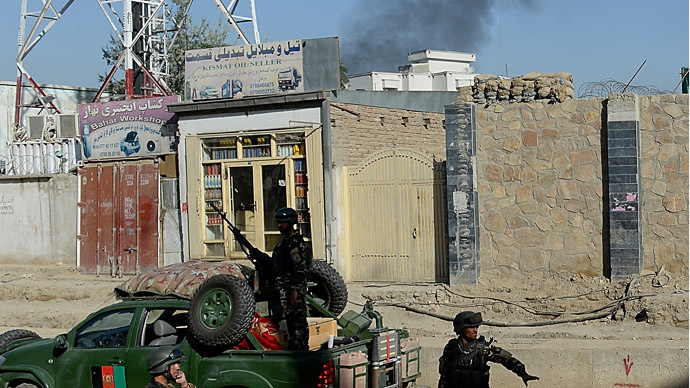‘Taliban aggression will increase as US withdrawal nears’

The Taliban’s aggression in Afghanistan will increase with the approach of the 2014 American combat troop withdrawal, political analyst and former Afghan MP Daoud Sultanzoy has told RT.
Early on Tuesday, Taliban militants launched a gun and bomb attack near Afghanistan's presidential palace and the US CIA headquarters in Kabul, one of the most secure places in the capital. Four attackers and three security guards were killed, according to officials.
Daoud Sultanzoy, commenting on the incident to RT, said he believes the attack was the Taliban’s “important signal” to the government.
RT:The Presidential palace is a symbolic target - what does it say about the state of security, when the Taliban can launch such an attack right in the heart of Kabul?
Daoud Sultanzoy: It’s a very brazen breach, which is very important in terms of its symbolism because this was one of the most strategic penetrations to send a signal to the Afghan government that while they’re opening an office in Qatar, they’re also continuing their military assault on very important targets. It’s very confusing for this government, while the government is interested in talking with Taliban, the Taliban are answering back with guns and explosives, so the government is in a very defensive and weak position when it comes to these things, but nevertheless, these kinds of breaches will happen because you can’t safeguard a city of this size completely, but the fact that they used international ISAF ID cards and came so close to the palace and other strategic points like the US embassy, the Ministry of Defense, CIA headquarters, and other key government installations. This is a very important signal that they’re trying to send to this government.
RT:Is the US right to push talks with the Taliban when the group's willing to launch these deadly attacks?
DS: This is the result of war fatigue by the foreign forces. They’ve already made a decision that they’ll continue on peace talks because they’re tired of this war, and they’ve already in fact sent the signal to the Taliban, “We will not be fighting this war with you, and we want to talk to you”. In fact, president Obama mentioned a while ago that the Taliban is not our enemy, so this confuses the people of Afghanistan: if they’re sending these kind of signals [about] the status of civilians in this country, what are these 10-years’ achievements in terms of civil society, in terms of women and other aspects of civil society? So these are all things that people are asking questions about, and they’re all in jeopardy.
RT: The war has been going on for 12 years in Afghanistan. Now the Western forces - the US and NATO – are really trying to get the Taliban to the peace talks table. Some are already saying that the US is capitulating to the requests of the Taliban. How do you see it?
DS: I think if you look at this, you can see parallels to the Vietnam peace process. When the US was preparing to leave Vietnam: on the one hand they were fighting and on the other hand, in Paris, they were talking. These kinds of wars have similar outcomes.
As the withdrawal gets closer and as the fatigue in western society is getting deeper, you will see more aggressive behavior from the other side, which in this case is the Taliban. In my opinion, this is going to escalate rather than decline.
The statements, views and opinions expressed in this column are solely those of the author and do not necessarily represent those of RT.












